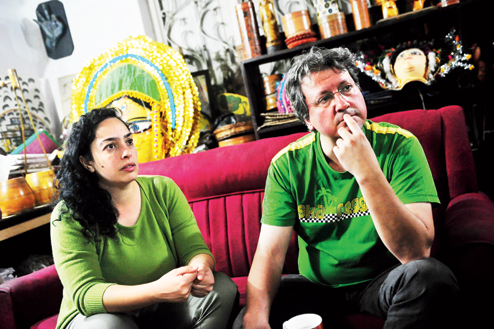 |
| Spanish RJs Araceli Tzigane and Juan Antonio Cazquez |
Dan Lawrence and Lucy Rivers travelled all the way to Calcutta from Wales last month for some first-hand fakiri experience. They were joined at the three-day Fakiri Utsav in Gorbhanga, Nadia, by Spanish RJs Araceli Tzigane and Juan Antonio Vazquez who were there to scout for talent.
From performing on stage with bauls and fakirs to jamming with them at the akhara, Lawrence and Lucy Rivers of the Welsh band Olion Byw did it all. “I play the mandolin while Lucy specialises in the violin. Lucy picked up the beats of the ektara almost as soon as she heard them. We’re very lucky we got to jam with Babu Fakir and others at the akharas in an informal atmosphere,” said Dan, who first read about fakirs in Mimul Sen’s book The Honey Gatherers and was “mesmerised”.
“I knew one day I’d come to India to meet a fakir and do his music,” recalled Dan, who saw his dream come true when he met Amitava Bhattacharya of Banglanatok in October last year. “He invited us to play at the festival and we agreed quite readily. I realised this was going to be both an emotional and musically enriching experience — an experience of a lifetime.”
Lucy, too, was overwhelmed by the “soulfulness of baul music”. “You see, the violin can be tuned in fairly well with the dotara. The response to our performance was heart-warming. Everyone was eager to know what we played and how we played it. The musical interludes in between verses just blew me over. During the jam session we were sharing music, playing together and doing verses alternately. It was a magical experience,” said Lucy. “The day began with music and gradually more and more music kept happening around us. We lived in tents, ate what the villagers cooked for us. For three days we lived the lives of fakirs and breathed their music!”
 |
| Welsh folk musicians Dan Lawrence and Lucy Rivers. Pictures by Anindya Shankar Ray & Sayantan Ghosh |
Bhattacharya, one of the organisers of the Fakiri Utsav, thinks community-led cultural tourism can help popularise folk music and dance of Bengal across the world. “For me the baul is not an entity to be preserved in a museum. They are artistes who also need to make a decent living. Festivals such as these help generate tourism, which in turn helps improve the state of village economy. I want to use culture as a tool to empower rural artistes economically,” he said.
It is the earthy feel that attracted Araceli and Juan, who run the Madrid-based music agency Mapamundi Musica, to the Fakiri Utsav to scout for talent. “There is a huge difference between folk music festivals in Spain and India. Here there are still some rural areas where you can go to if you are looking for an escape from urban life. But Spain has very few rural areas left. This in turn leads to churning out less of country music. Privatisation has modernised even our villages. In India there is the right balance of economy and culture,” Juan said.
The duo host a two-hour radio show where they play music from all over the world. The programme is broadcast in nine countries — Spain, France, Germany, Chile, Bolivia, Uruguay, Mexico, Puerto Rico and Peru.
“We’ve played baul music on our radio show before coming here. Paban Das Baul is very famous in Europe and Latin America. But we want to know about the others too. We want to tell their stories,” Araceli said.
For Juan, the most interesting aspect of the festival was the absence of mics. “This is unthinkable in the West. Also there aren’t any star performers. Each musician who goes up on the stage is treated with equal respect. Only when you have an audience that totally identifies with the music can you expect such decorum!”










